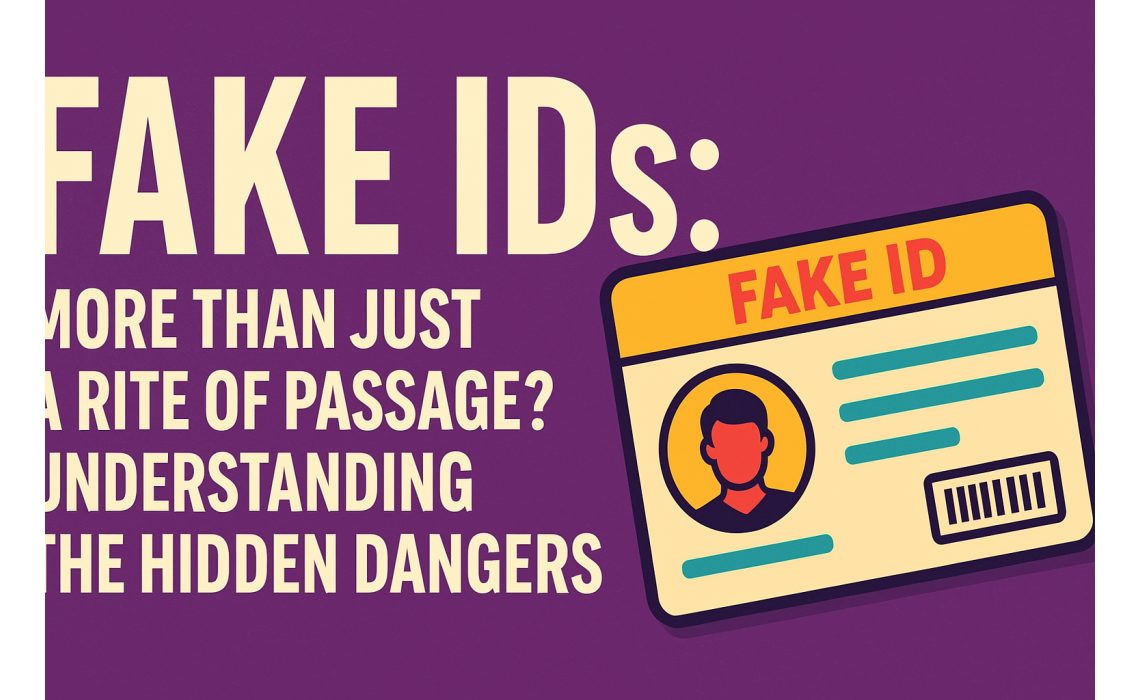Fake IDs: More Than Just a Rite of Passage? Understanding the Hidden Dangers
Fake IDs: More Than Just a Rite of Passage? Understanding the Hidden Dangers
Overview
Fake IDs are often glamorized in movies and pop culture as a harmless teenage rebellion—a ticket to nightclubs, alcohol, or concerts. But behind the allure lies a dangerous underworld of crime, identity theft, and lifelong consequences. This blog explores why fake IDs are used, who they harm, and how society is fighting back.
1. Why Do People Use Fake IDs?
While motivations vary, common reasons include:
●Underage Access: Minors seeking alcohol, tobacco, vaping products, or entry to 21+ venues.
●Immigration and Employment: Undocumented individuals using forged documents to secure jobs or housing.
●Identity Theft: Criminals impersonating others to commit fraud, launder money, or evade law enforcement.
●Cybercrime: Creating fake social media accounts or bypassing age-restricted online platforms.
Stat: A 2023 Journal of Adolescent Health study found that 1 in 5 U.S. college students admitted to using a fake ID.
2. The Industries Most Affected
Fake IDs don’t just impact individuals—they strain entire sectors:
●Hospitality: Bars, clubs, and liquor stores face hefty fines for non-compliance.
●Retail: Tobacco and vaping shops risk losing licenses for underage sales.
●Banking: Synthetic identities (fake IDs + real SSNs) cost U.S. banks $20 billion annually (Federal Reserve).
●Travel: Counterfeit passports enable human trafficking and illegal border crossings.
3. Consequences of Using or Accepting Fake IDs
For Individuals:
●Legal Penalties:
○Misdemeanor charges (fines, community service) to felony charges (prison time) depending on intent.
○Permanent criminal records affecting jobs, loans, and travel visas.
●Identity Theft: Fake ID buyers often provide personal data to black-market vendors, risking exposure on the dark web.
For Businesses:
●Fines: Up to $15,000 per violation (FDA tobacco penalties).
●Reputational Damage: Loss of customer trust after publicized violations.
●Operational Shutdowns: Repeat offenses can lead to revoked liquor or retail licenses.
For Society:
●Public Safety Threats: Underage drunk driving, drug abuse, and human trafficking.
●Economic Costs: Taxpayer funds diverted to law enforcement and healthcare systems.
4. How Fake IDs Are Made: A Look at the Supply Chain
Modern counterfeiters use alarming tactics:
●Dark Web Marketplaces: Sites like AlphaBay (before its shutdown) sold fake IDs for Bitcoin.
●3D Printing and Holograms: High-tech tools replicate security features on passports and licenses.
●Insider Corruption: Bribed government employees leak templates or materials (e.g., the 2018 DMV scandal in California).
Case Study: In 2022, Europol dismantled a ring selling "EU COVID Passports" to unvaccinated travelers, highlighting how crises fuel fake ID demand.
5. Fighting Back: Technology and Policy Solutions
A. Advanced Verification Tools
●AI Scanners: Apps like IDScan.io detect manipulated photos, fonts, and holograms.
●Biometric Checks: Facial recognition at airports (e.g., Dubai’s Smart Gates) and digital IDs (e.g., India’s Aadhaar).
●Blockchain: Tamper-proof digital identities (e.g., Estonia’s e-Residency) prevent forgery.
B. Policy and Education
●REAL ID Act: U.S. mandates for secure, standardized licenses by 2025.
●Sting Operations: Undercover checks on retailers (e.g., FDA’s "No Tobacco Under 21" campaigns).
●School Programs: Workshops on the risks of fake IDs, like the FBI’s “Think Before You Fake” initiative.
6. Ethical Dilemmas and Gray Areas
●Humanitarian Concerns: Should undocumented migrants using fake IDs to survive be treated the same as criminals?
●Privacy vs. Security: Critics argue biometric databases (e.g., facial recognition) infringe on civil liberties.
●Cultural Shifts: In Europe, lower drinking ages reduce fake ID demand compared to the U.S.
Wrap Up : A Collective Responsibility
The use of fake IDs is more than a personal gamble—it’s a societal challenge requiring collaboration between individuals, businesses, and governments. While technology like AI and blockchain is making counterfeits harder to create, lasting change depends on education, empathy, and ethical accountability.


